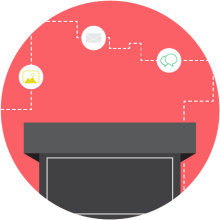
Everyone has the right to participate in the governance of the Internet. The Internet should be governed in such a way as to uphold and expand human rights to the fullest extent possible. The Internet governance framework must be open, inclusive, accountable, transparent and collaborative.
Related resources
The report presents the findings of a study on what governments are doing to inhibit citizens’ access to ICT, for example content blocks, censorship, filtering, infrastructure control, law-making, court cases; how governments are using ICT activity and data to monitor citizens; and how government bodies and functionaries are using propaganda, impersonation, threats, cloning, and other tactics to shape online content in their favour.
Full country reports are available for ten countries: Burundi, Democratic Republic of Congo, Ethiopia, Kenya, Rwanda, Somalia, Tanzania, Uganda, Zambia and Zimbabwe. The research was conducted as part of CIPESA’s OpenNet Africa initiative (www.opennetafrica.org), which monitors and promotes internet freedom in Africa.
This research was carried out by the Collaboration on International ICT Policy for East and Southern Africa (CIPESA) as part of the OpenNet Africa initiative (www.opennetafrica.org), which monitors and promotes Internet freedom in Africa.
The report presents the findings of a study on what the government in Uganda is doing to inhibit citizens’ access to ICT, for example content blocks, censorship, filtering, infrastructure control, law-making, court cases; using ICT activity and data to monitor citizens; and how government bodies and functionaries are using propaganda, impersonation, threats, cloning, and other tactics to shape online content in their favour. Other country reports for Burundi, Democratic Republic of Congo, Ethiopia, Kenya, Rwanda, Somalia, Tanzania, Zambia and Zimbabwe as well as a regional State of Internet Freedom in Africa 2016 report, are also available.
This research was carried out by the Collaboration on International ICT Policy for East and Southern Africa (CIPESA) as part of the OpenNet Africa initiative (www.opennetafrica.org), which monitors and promotes Internet freedom in Africa.
The report presents the findings of a study on what the government in Democratic Republic of the Congo (DRC) is doing to inhibit citizens’ accessto ICT, for example content blocks, censorship, filtering, infrastructure control, law-making, court cases; using ICT activity and data to monitor citizens; and how government bodies and functionaries are using propaganda, impersonation, threats, cloning, and
other tactics to shape online content in their favour. Other country reports for Burundi, Ethiopia, Kenya, Rwanda, Somalia, Tanzania, Uganda, Zambia and Zimbabwe as well as a regional State of Internet Freedom in Africa 2016 report, are also available.